The Dean of the Faculty of Al-Alsun receives the Director of the Japanese Culture Center in Cairo following her tour of Japan
Prof. Salwa Rashad, Dean of the Faculty of Al-Alsun at Ain Shams University, and Supervisor of the Japanese Language Department, received Mrs. Ayumi Hashimoto, Director of the Japanese Culture Center of the Japan Foundation in Cairo, and her accompanying delegation, in the presence of Dr. Muhammad Abdel-Rahman Ashiba, Lecturer in the department.
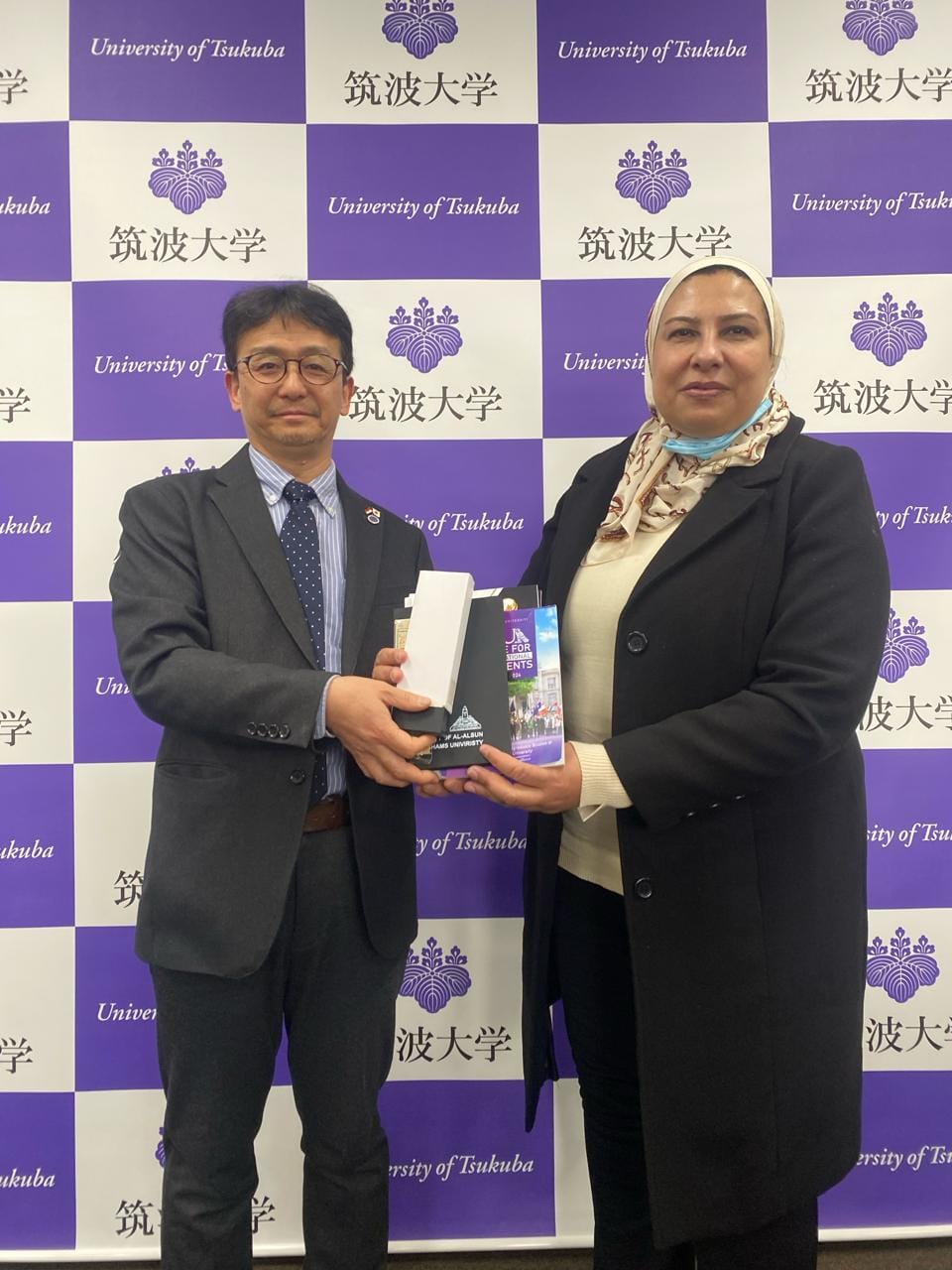 |
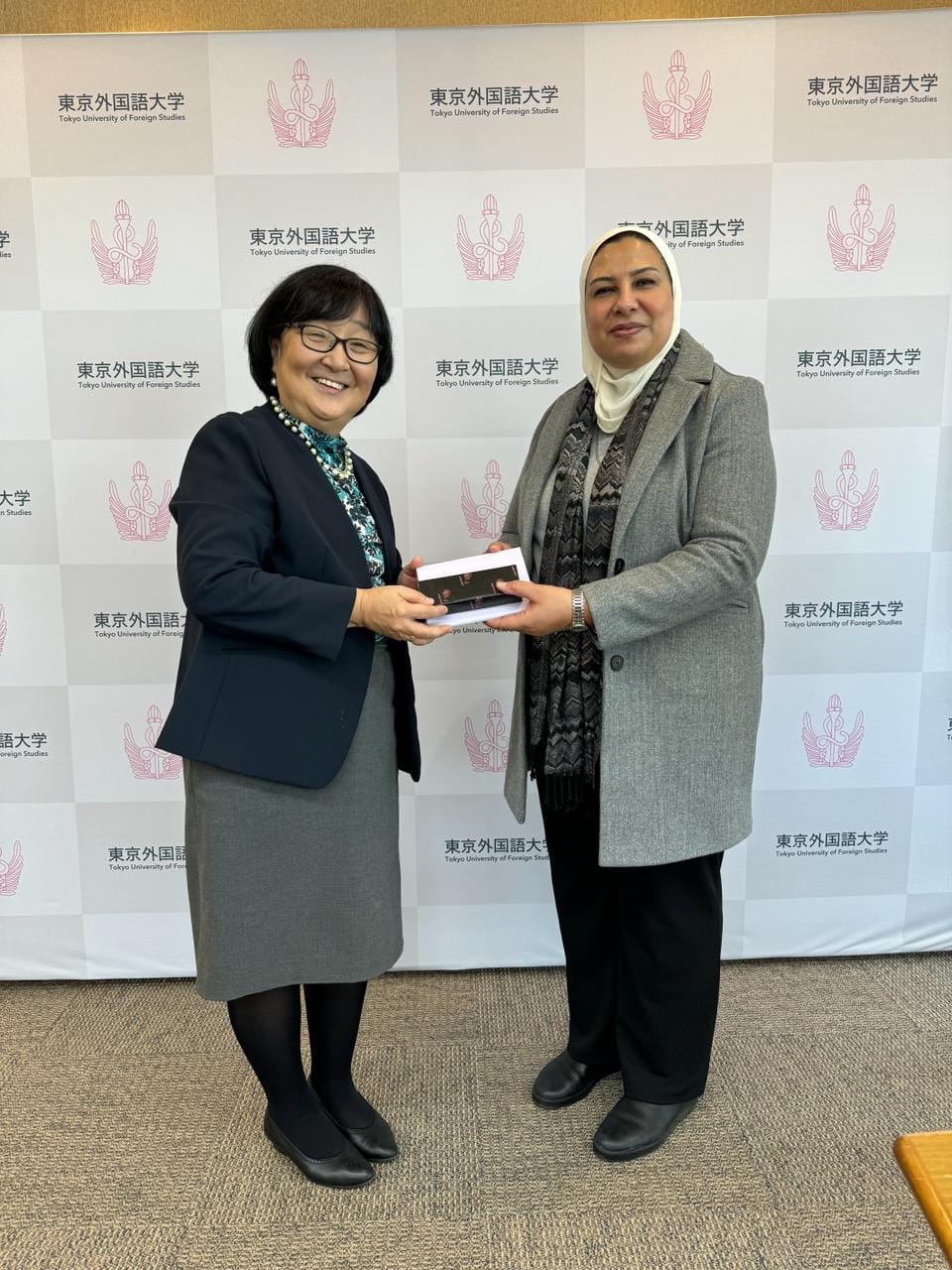 |
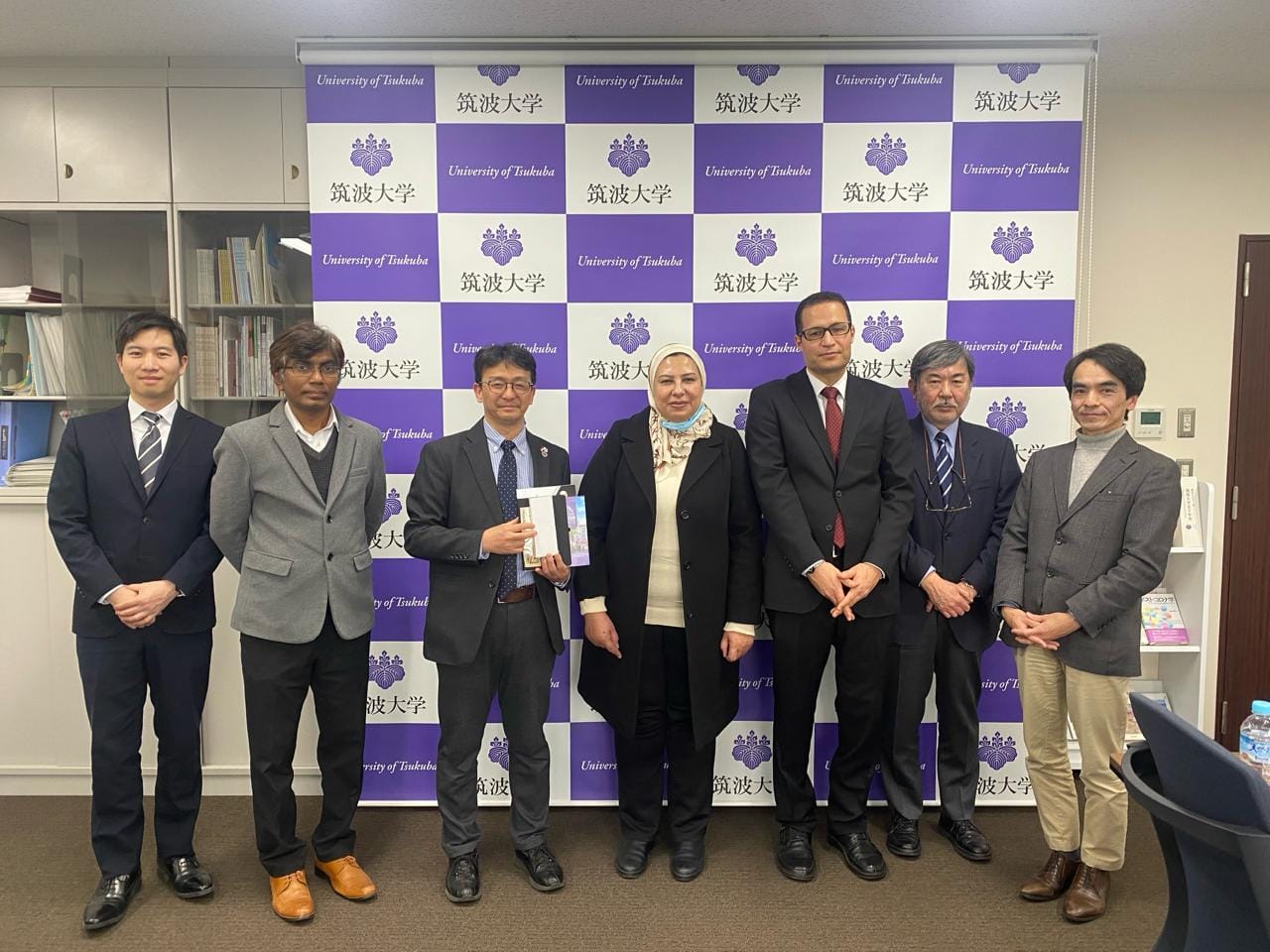 |
||
The meeting came after the recent tour made by Prof. Dr. Salwa Rashad, Dean of the Faculty, in the friendly country of Japan to enhance cooperation with Japanese universities.
During the meeting, Prof. Salwa Rashad, Dean of the Faculty, stressed the importance of continuing communication and exchange with Japanese universities to preserve the gains achieved and to strengthen relations with Japanese universities, and to make the most of the results of the visit in supporting the Japanese Language Department and its researchers, and increasing exchange opportunities at different levels of students, researchers and faculty staff with Japanese universities with which we have cooperation agreements, as well as continuing to communicate with new universities to open horizons for cooperation and practical and academic exchange.
The discussion also touched on the technical aspects of the contract being discussed between Ain Shams University and the Japan Foundation in Tokyo regarding the Japanese Language Proficiency Test (JLPT) contract.
We hope that discussions related to the technical aspects will be completed sooner and progress will be made to conclude the agreement as soon as possible.
Dr. Salwa Rashad, Dean of the Faculty, expressed her deep thanks to the Japan Foundation for the cooperation and support it has provided to the Japanese Language Department at the Faculty of Al-Alsun since the establishment of the department, hoping to continue this cooperation and support between the two sides.
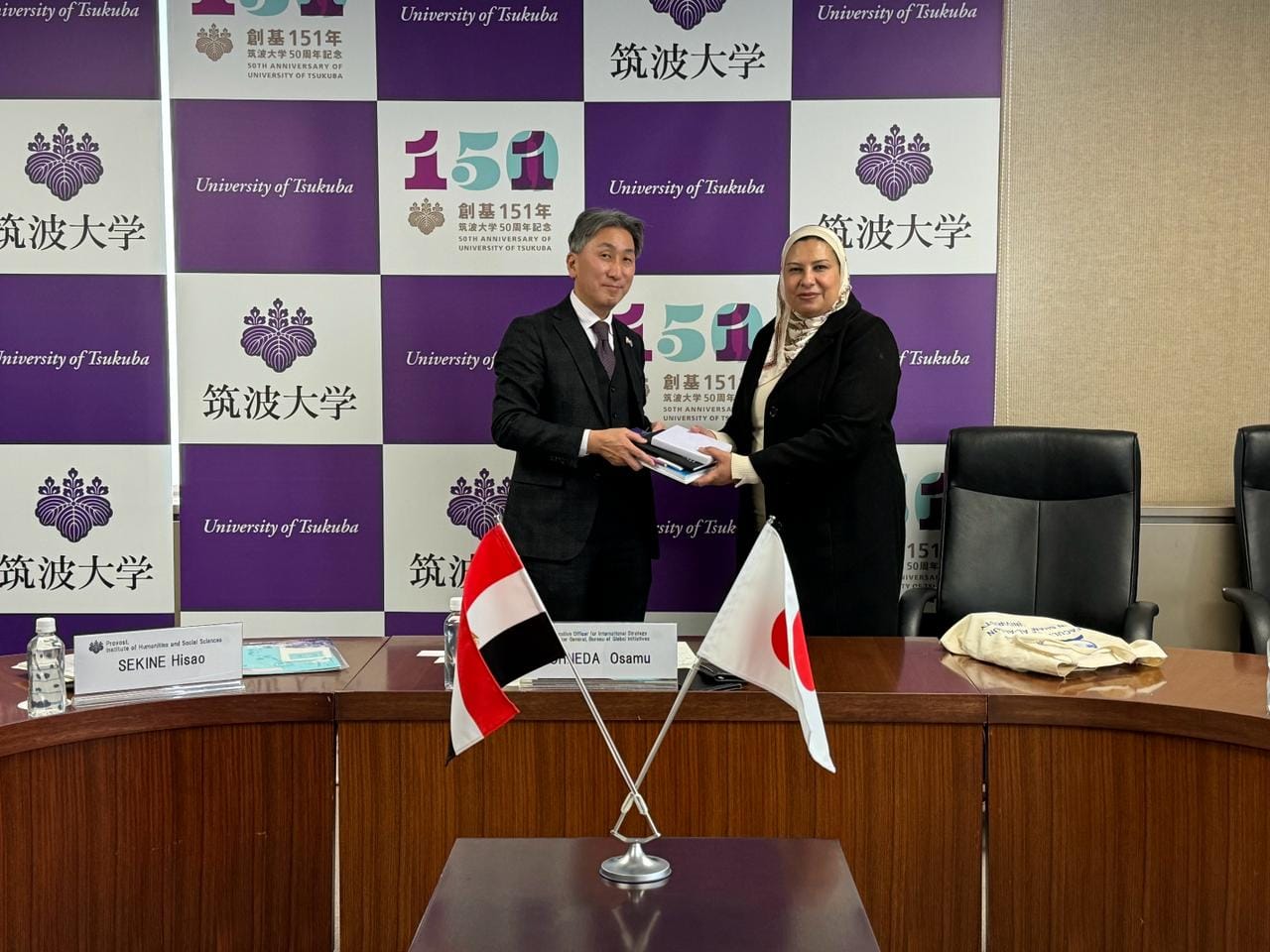 |
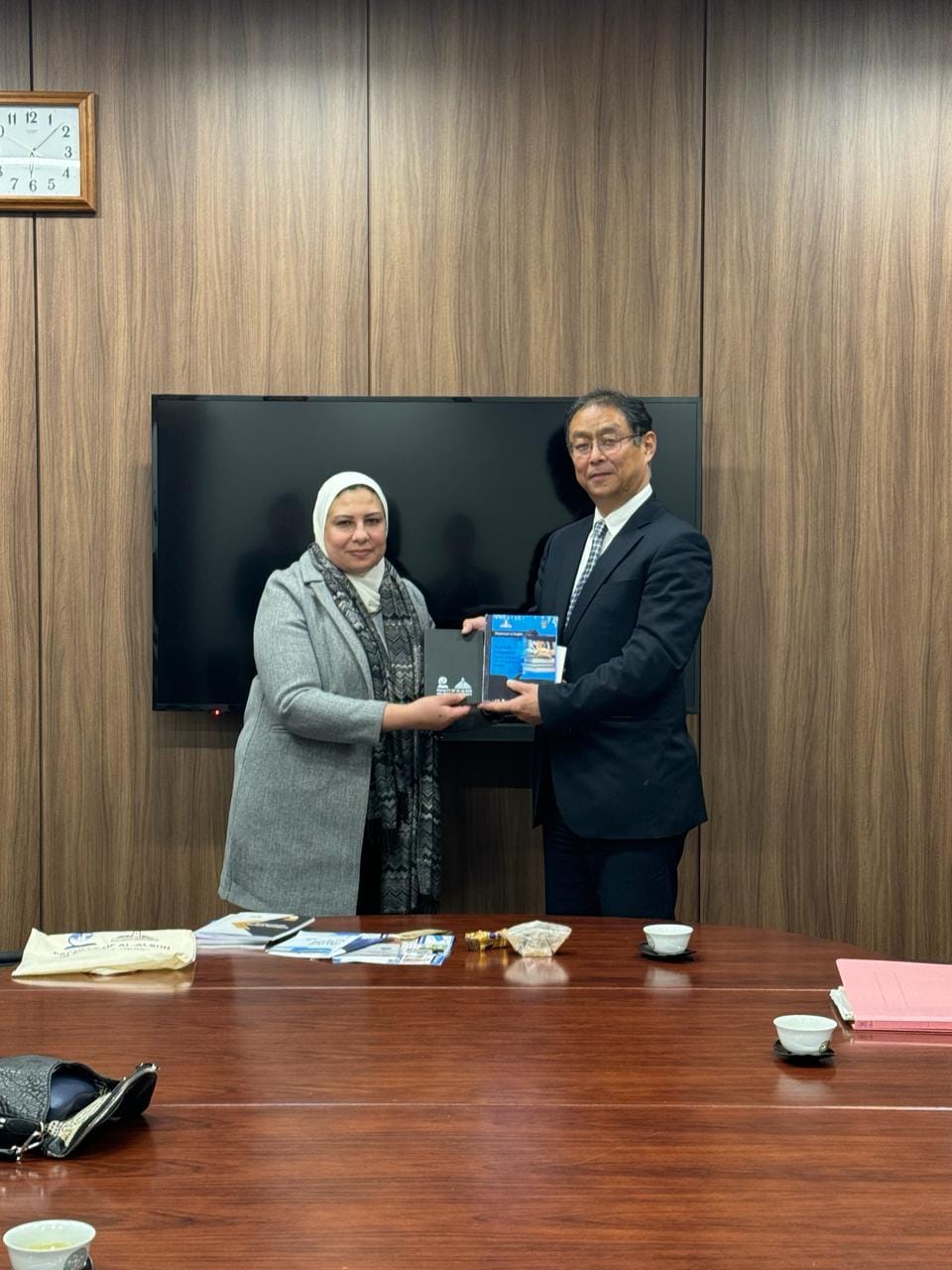 |
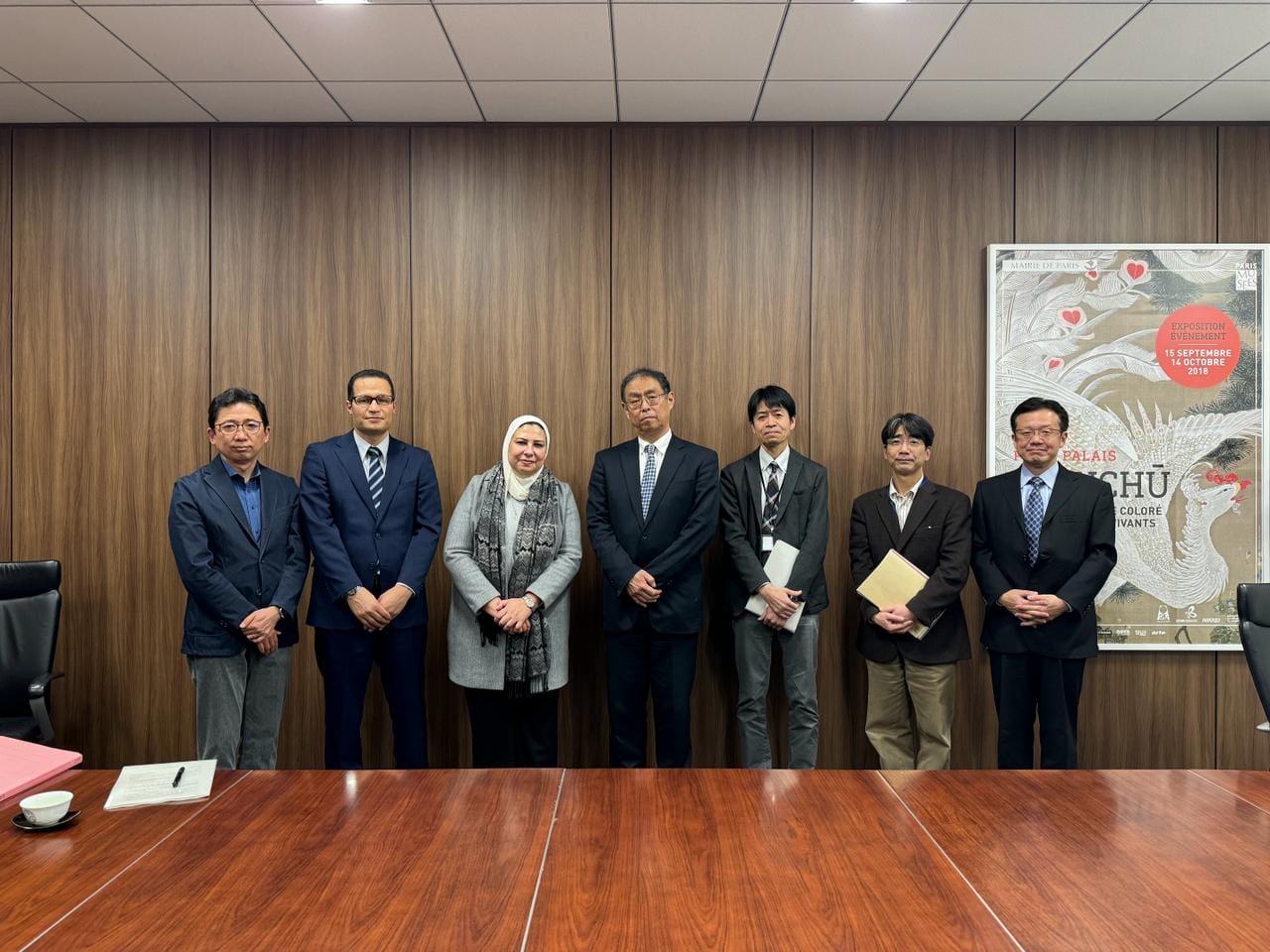 |
||
It is worth noting that last January, at the invitation of the Japan Foundation in Cairo, Prof. Salwa Rashad, Dean of the Faculty of Al-Alsun at Ain Shams University, went to Japan to visit a number of universities and research centers. Her Excellency was accompanied on the visit by Dr. Muhammad Abdel-Rahman Ashiba, Lecturer in the department, and Mr. Onodera, Deputy Director of the Japan Foundation Office in Cairo, where the visit extended for approximately 10 days, during which six universities, a research center and another educational center were visited in six different cities.
This visit aims primarily to consolidate relations with Japanese partners by focusing on the universities with which the Faculty of Al-Alsun has had relations and agreements for many years following the establishment of the Japanese Language Department at the faculty in 2000, and to expand the frameworks of cooperation and exchange with those universities. At the same time, new cooperation horizons were opened with a number of new universities and research centers to increase the opportunities available for students, faculty staff, and teaching assistants to obtain grants or exchange programs to continue their studies and research in Japan.
The visit took place at the Tokyo University of Foreign Studies, which is one of the first universities to have a student and academic exchange agreement with the Faculty of Al-Alsun. The visit came at an important time before the start of the procedures for renewing the agreement with this university next July 2024. During the visit, it was confirmed that the two parties wanted to renew the agreement for a new period of five years after carrying out the official procedures and obtaining the necessary approvals from the competent authorities. The Director of the Tokyo University of Foreign Studies confirmed the university’s intention to establish an office at Ain Shams University under the name “Japan Global Office.” It is based on supporting communication with Egyptian universities, especially Ain Shams University, and to strengthen relations and exchange during the next stage. This matter was greatly welcomed by the Dean of the Faculty of Al-Alsun, with confirmation of the readiness of the Faculty of Al-Alsun to provide all forms of support and assistance to facilitate the establishment of this office, especially since the Tokyo University of Foreign Studies is one of the most prestigious Japanese universities that teaches the Arabic language, and receives students from the Faculty of Al-Alsun annually to study the Japanese language there, and the Faculty of Al-Alsun also receives students from the Tokyo University of Foreign Studies as part of an exchange agreement between the two universities.
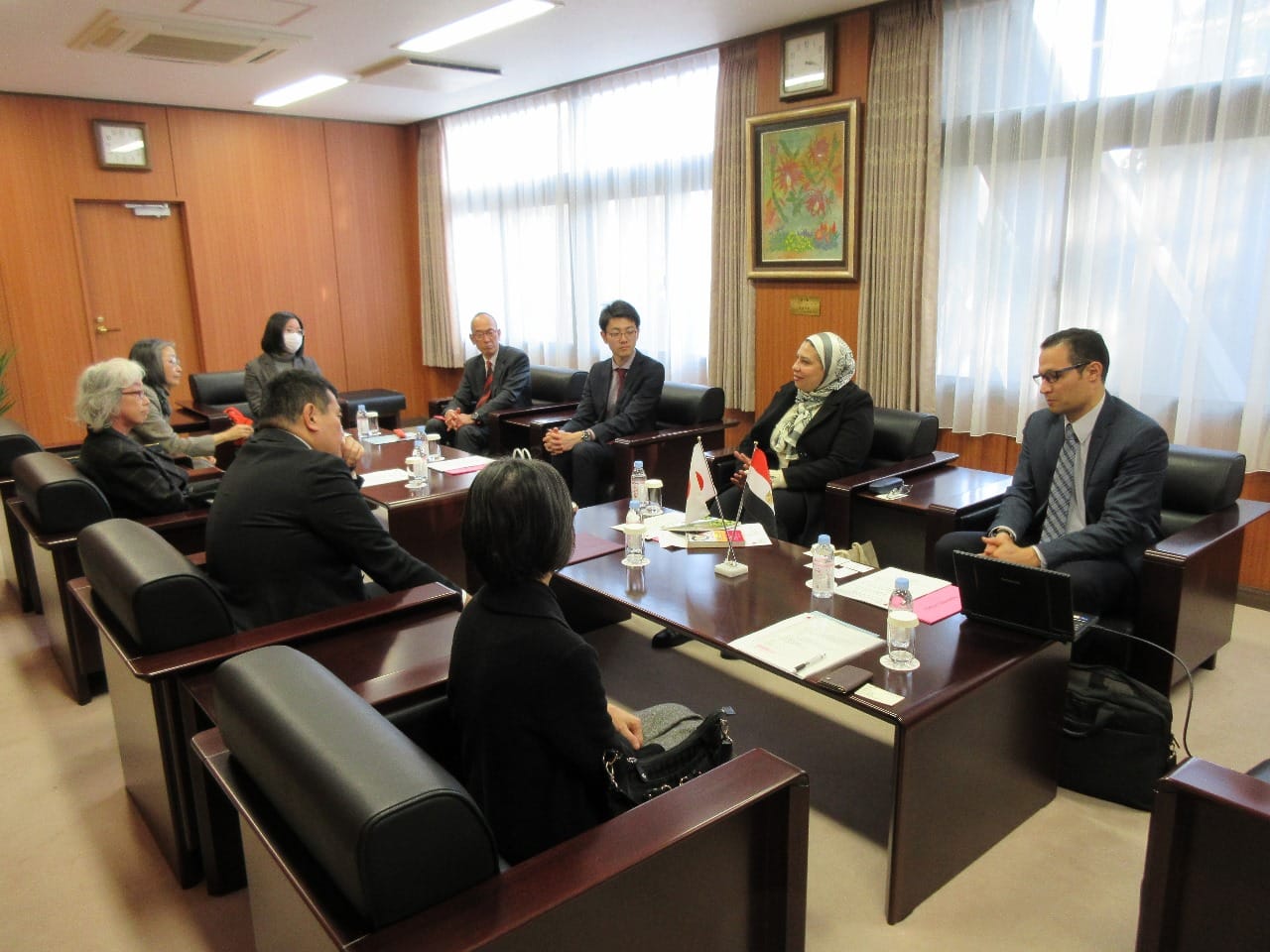 |
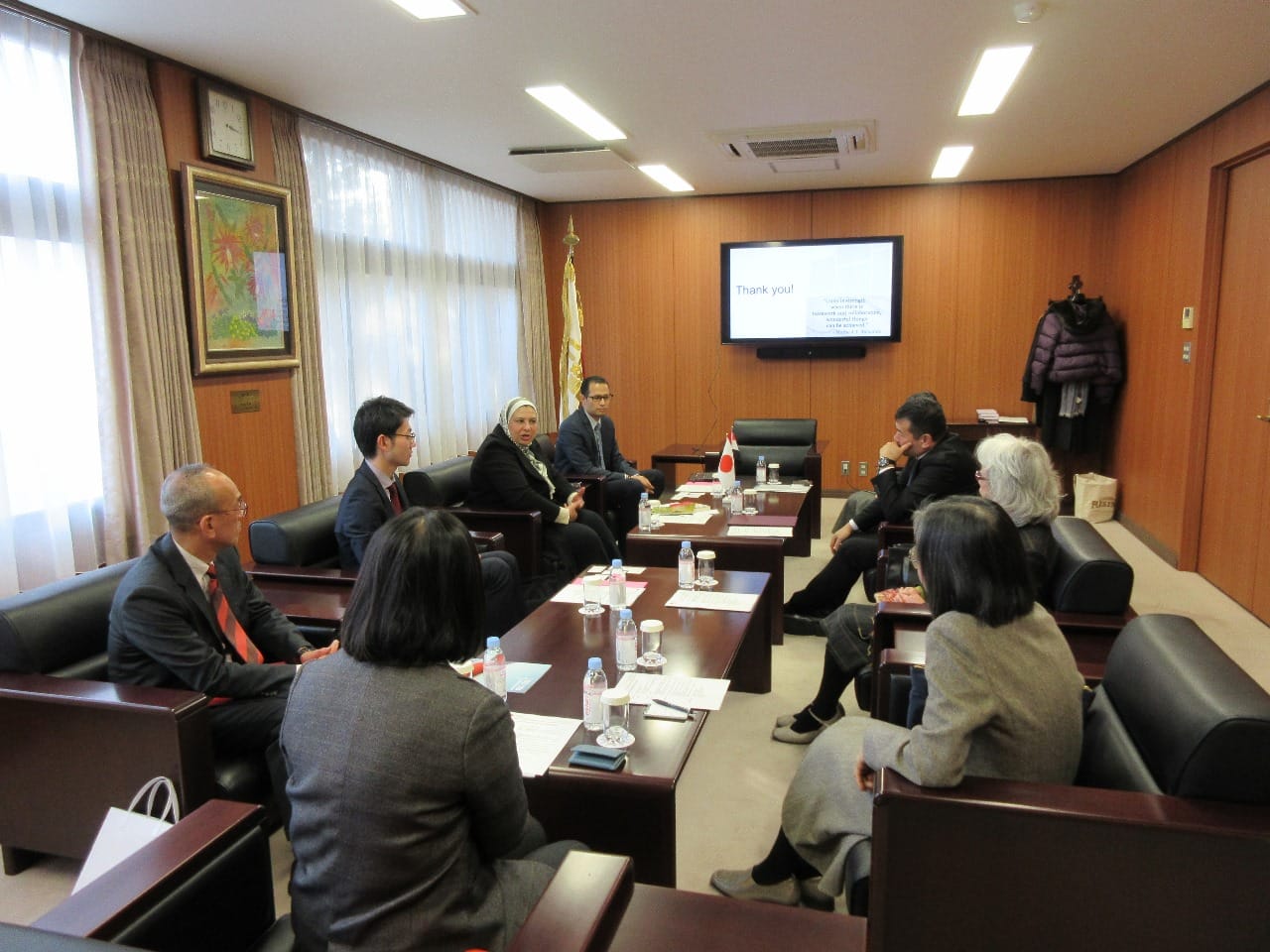 |
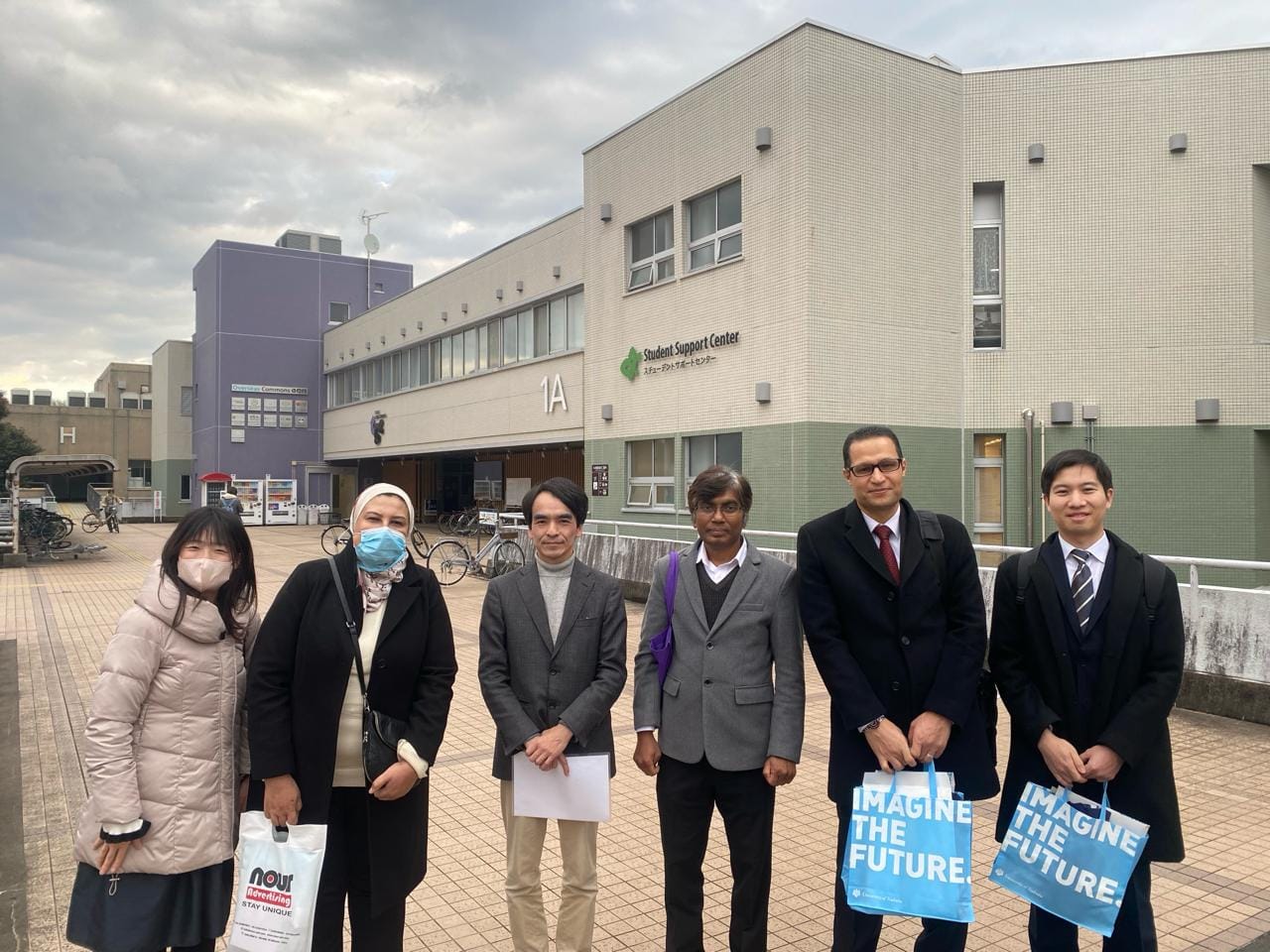 |
||
They also went to the main headquarters of the Japan Foundation in Tokyo to meet with the Deputy Director of the Japan Foundation in Tokyo, where they discussed a number of topics related to sending experts from the Japan Foundation to the Japanese Language Department in the Faculty and other forms of support and academic programs provided by the Japan Foundation. Negotiations related to holding Japanese language tests (JLPT) at the Faculty of Al-Alsun were also discussed, where emphasis was placed on working to quickly address the outstanding matters to reach an agreement on the technical aspects of the text of the agreement in preparation for obtaining the necessary approvals before signing it.
We also went to the University of Tsukuba, one of the prestigious public universities in Japan, which ranks third or fourth among Japan’s approximately 800 universities that have an exchange agreement with the Faculty of Al-Alsun. Every year, 2 students study at this university with a full scholarship, and 2 with a partial scholarship, which is to exempt students from the Faculty of Al-Alsun from tuition fees only. A number of topics were discussed with University of Tsukuba officials, especially at the level of exchange of researchers and faculty staff. The university also expressed its desire to send students on its side to study at Ain Shams University within the exchange program, which was welcomed by the Dean of the Faculty of Al-Alsun. After this meeting, a meeting was held with a number of professors of the Japanese language and professors of Arabic and Islamic studies to talk in detail about the exchange at the level of graduate students and researchers in the fields of Japanese language and Japanese literature, for students and researchers of the Arabic-Japanese Language Department at the Faculty of Al-Alsun, and students and researchers at the University of Tsukuba.
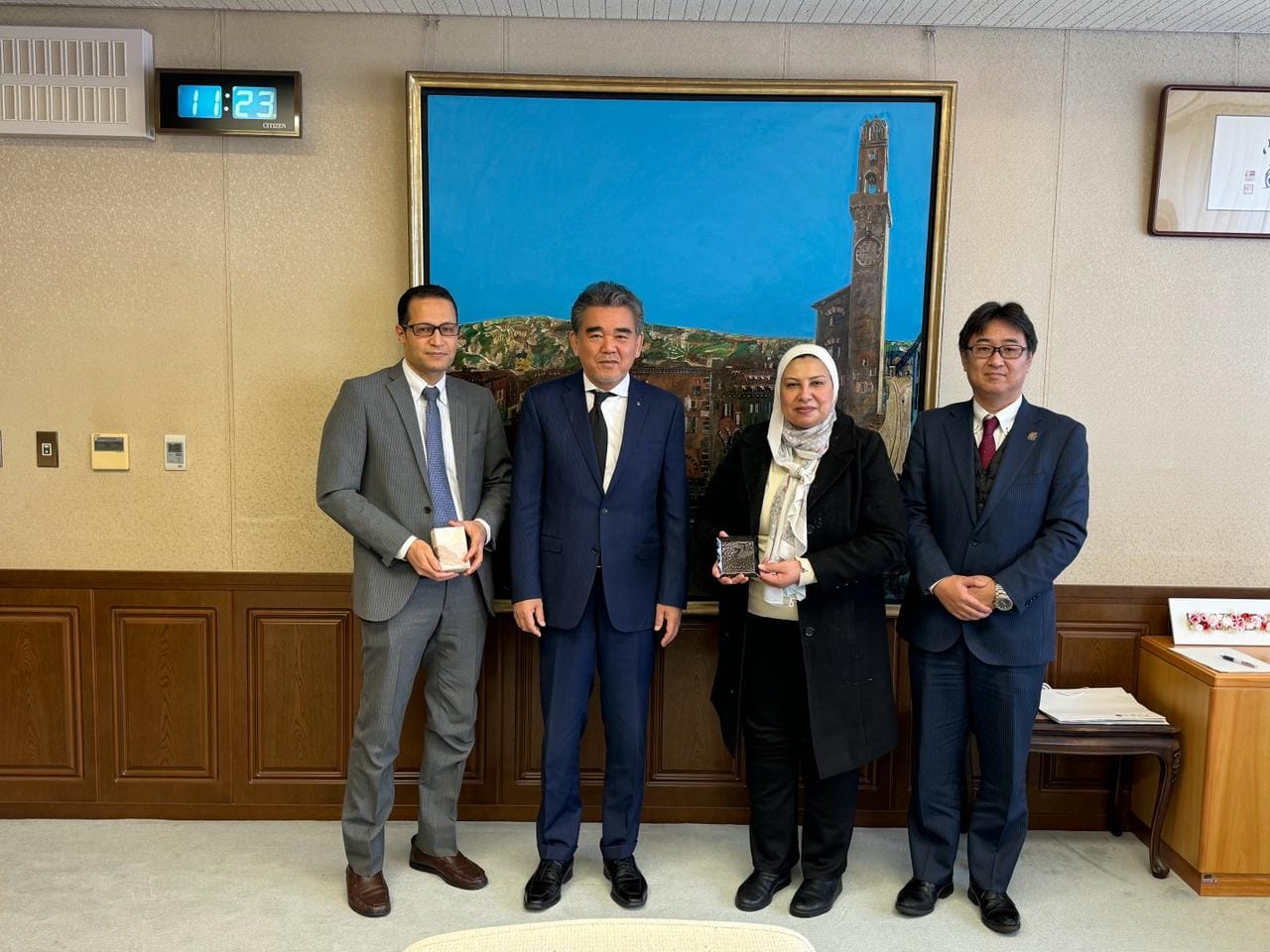 |
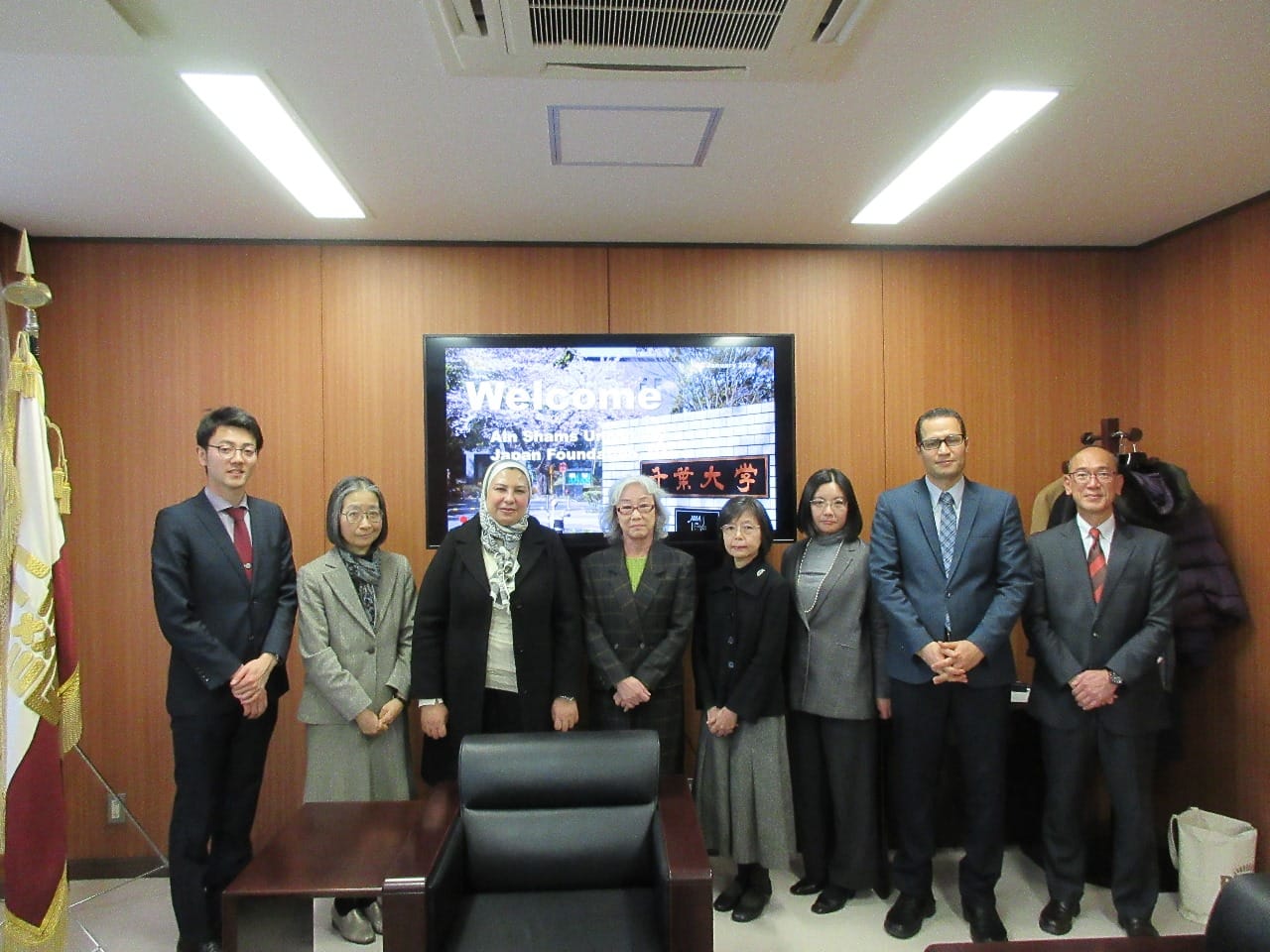 |
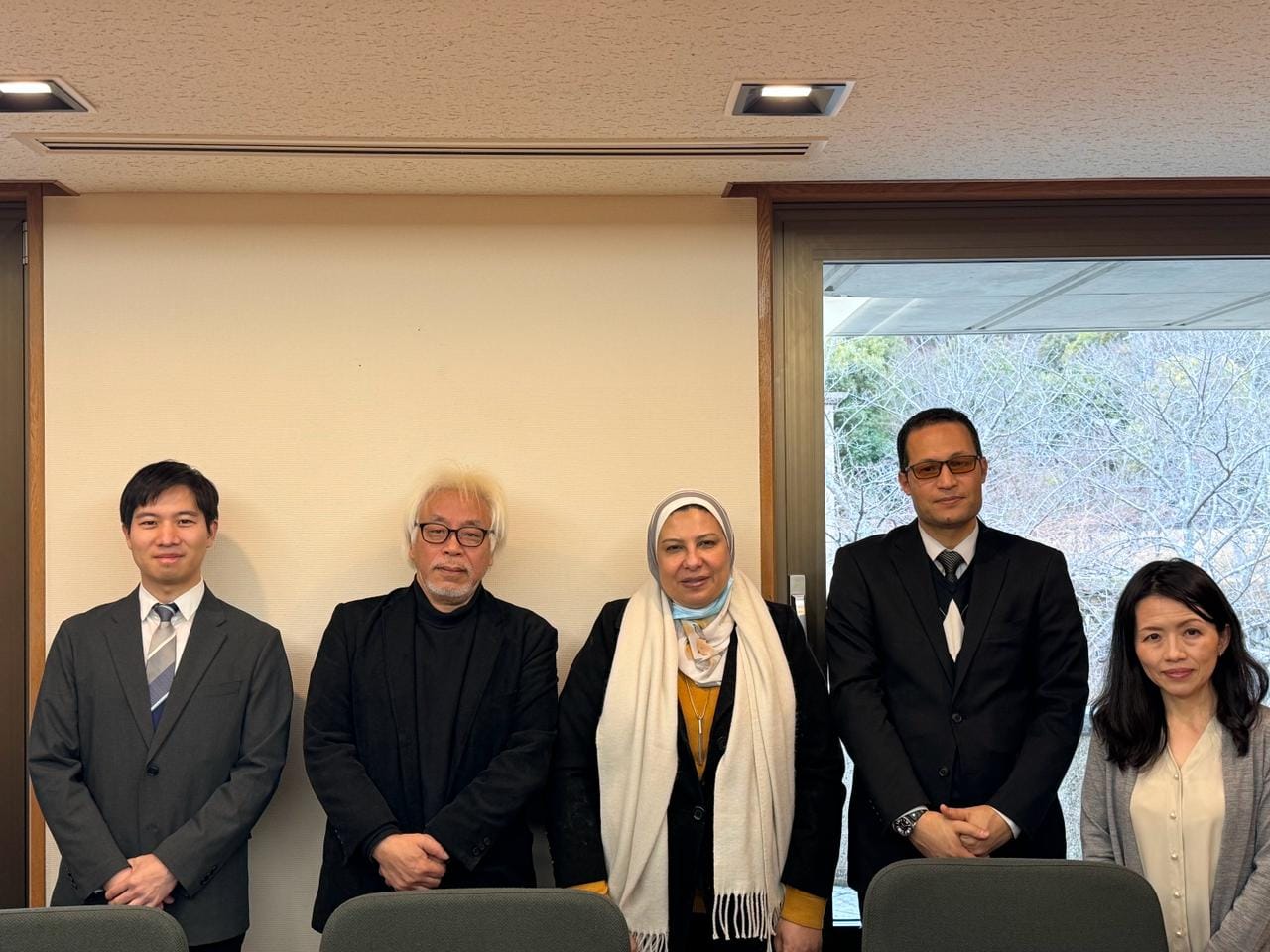 |
||
Prof. Salwa Rashad, Dean of the Faculty of Al-Alsun at Ain Shams University, moved to Fukuoka Prefecture, the southernmost part of Japan, where she headed the next morning, January 24, to Kyushu University, which is also one of the oldest and most important Japanese public universities, which includes the J-MENA office responsible for the Japan Study Network project for the Middle East and North Africa, based in Cairo. Discussions were held with university officials about ways to increase academic exchange opportunities at the graduate level and faculty members, which the university welcomed if there were researchers whose specializations were compatible with the fields of study available at the Faculty of Al-Alsun. They confirmed that they would coordinate with professors whose specializations were in the field of Arab and Islamic studies. It is worth noting that this university is attended by a male and female student from the Japanese Language Department at the Faculty of Al-Alsun for a year on a full scholarship as part of the exchange agreement.
The tour also saw a trip to Hiroshima Prefecture, and a meeting was held with the university’s rector and his deputy for international cooperation. The strong relations between Hiroshima University and a number of Egyptian universities in general and Ain Shams University in particular were discussed, and Hiroshima University’s keenness to cooperate and exchange with Ain Shams University. Especially after the visit made by Prof. Mamdouh El-Damaty, former Minister of Antiquities and former Dean and Professor of Archeology at the Faculty of Archeology, at Ain Shams University, to Hiroshima University, as part of the university’s celebration of 75 + 75 years of its history, which was also attended by the Japanese Ambassador to Cairo, Mr. Oka Hiroshi. It is worth noting that Ain Shams University has an exchange agreement with Hiroshima University. It was signed in 2015 and is in effect at the present time. The two universities are seeking to expand the work of the agreement at the level of student exchange in principle and in an expanded manner to include students of the various faculties at the two universities.
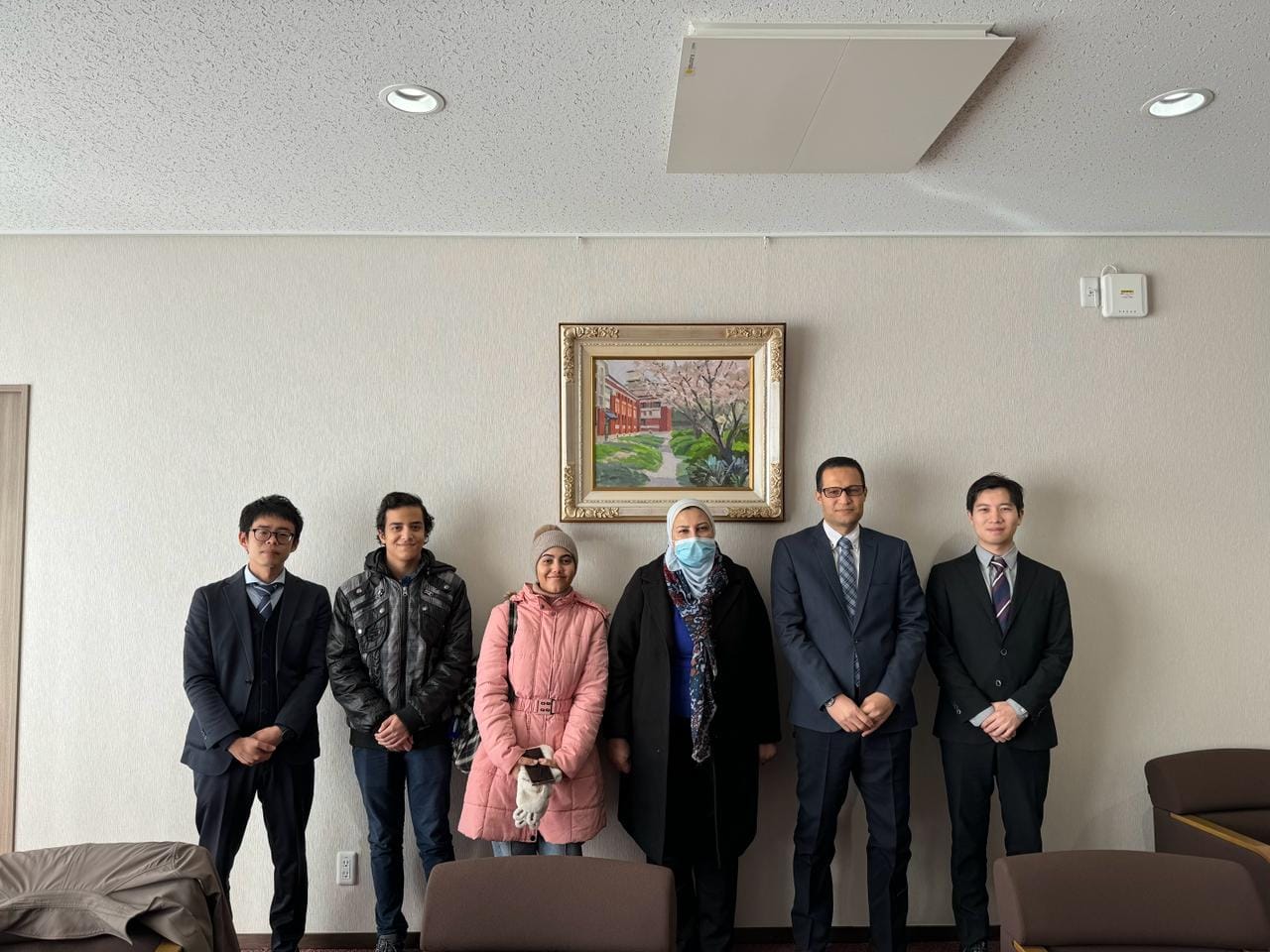 |
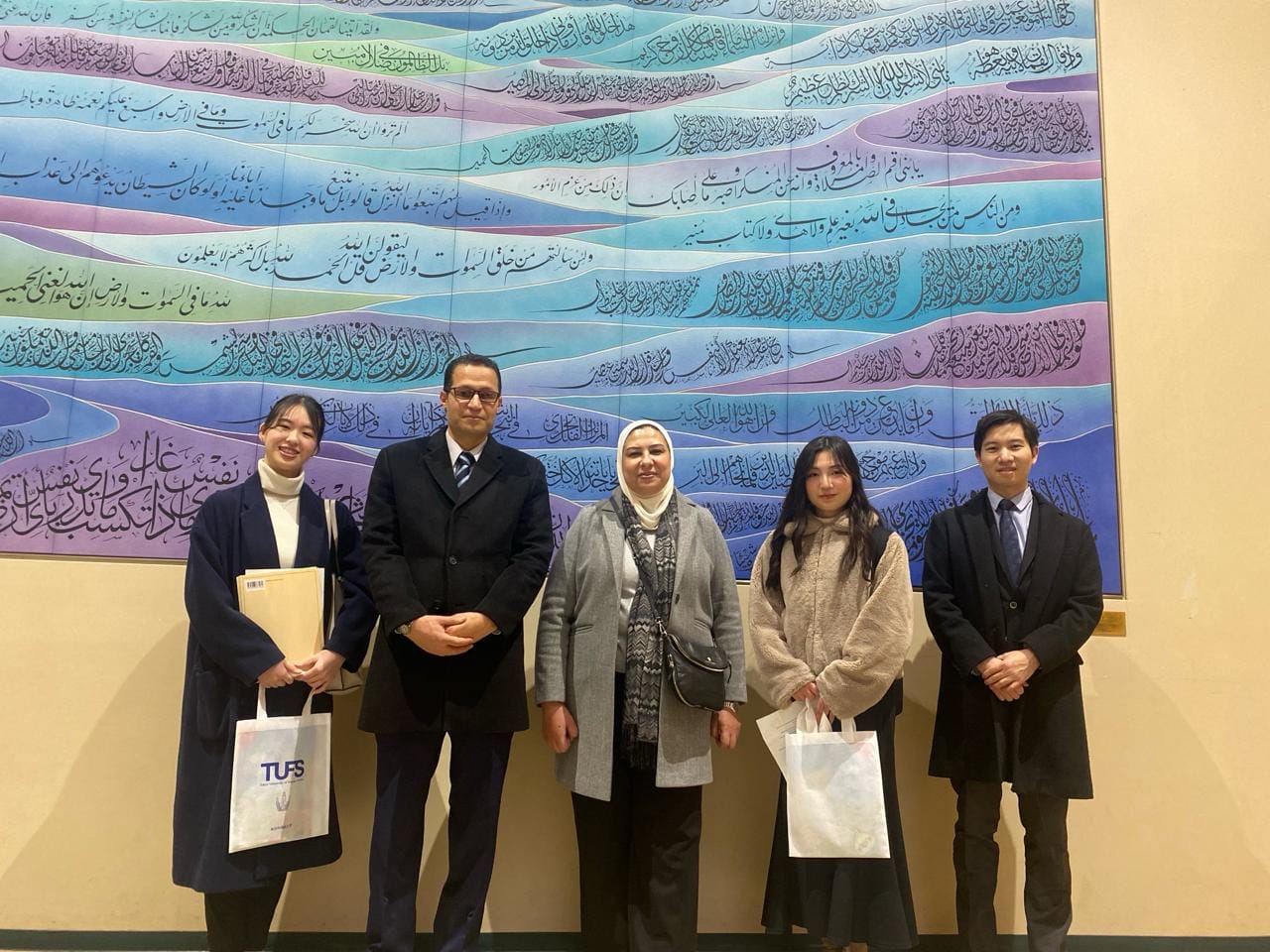 |
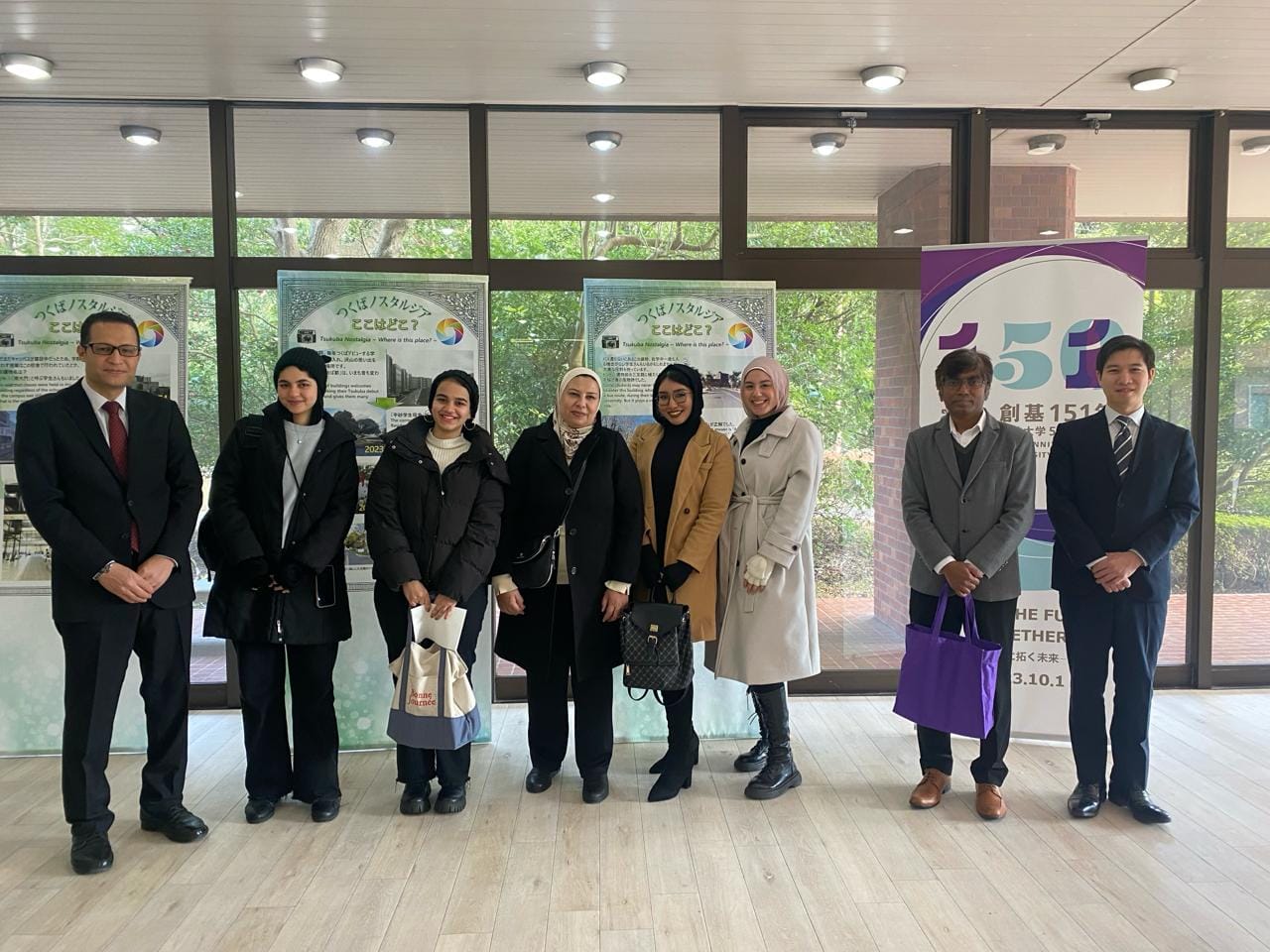 |
||
The delegation moved to the city of Kyoto, where they visited the Nichibunken Center, which is the famous international center for studies of Japanese culture, which owns a library in the fields of linguistics, literature, and history containing more than 600 thousand works. This center receives a large number of researchers from inside and outside Japan and holds scientific conferences in The areas of specialized research in which a number of scientific publications and research are published annually, as this center has a membership system for a number of universities from inside and outside Japan, which enables them to send their researchers to do master’s, doctoral, and post-doctoral research within the halls of the center. Possible ways of cooperation with the Center were discussed, including the possibility of providing faculty staff and teaching assistants in the Japanese Language Department to have the opportunity to continue their research on the various stages available at the Center and to benefit from the Center’s valuable library. It was also confirmed that the Center provides the service of photocopying and international sending of books, magazines, and scientific research. As a paid service to facilitate researchers inside and outside Japan.
She also visited the city of Osaka, the second largest city in Japan, where we began visiting the Kansai Center for International Education of the Japan Foundation, which is concerned with teaching the Japanese language and raising the level of the language for students, in addition to providing the necessary academic support to researchers in the fields of the Japanese language and Japanese literature.
This is done in cooperation with university professors in the same specialty for each researcher through grants provided by the Japan Foundation to researchers in the doctoral stage.
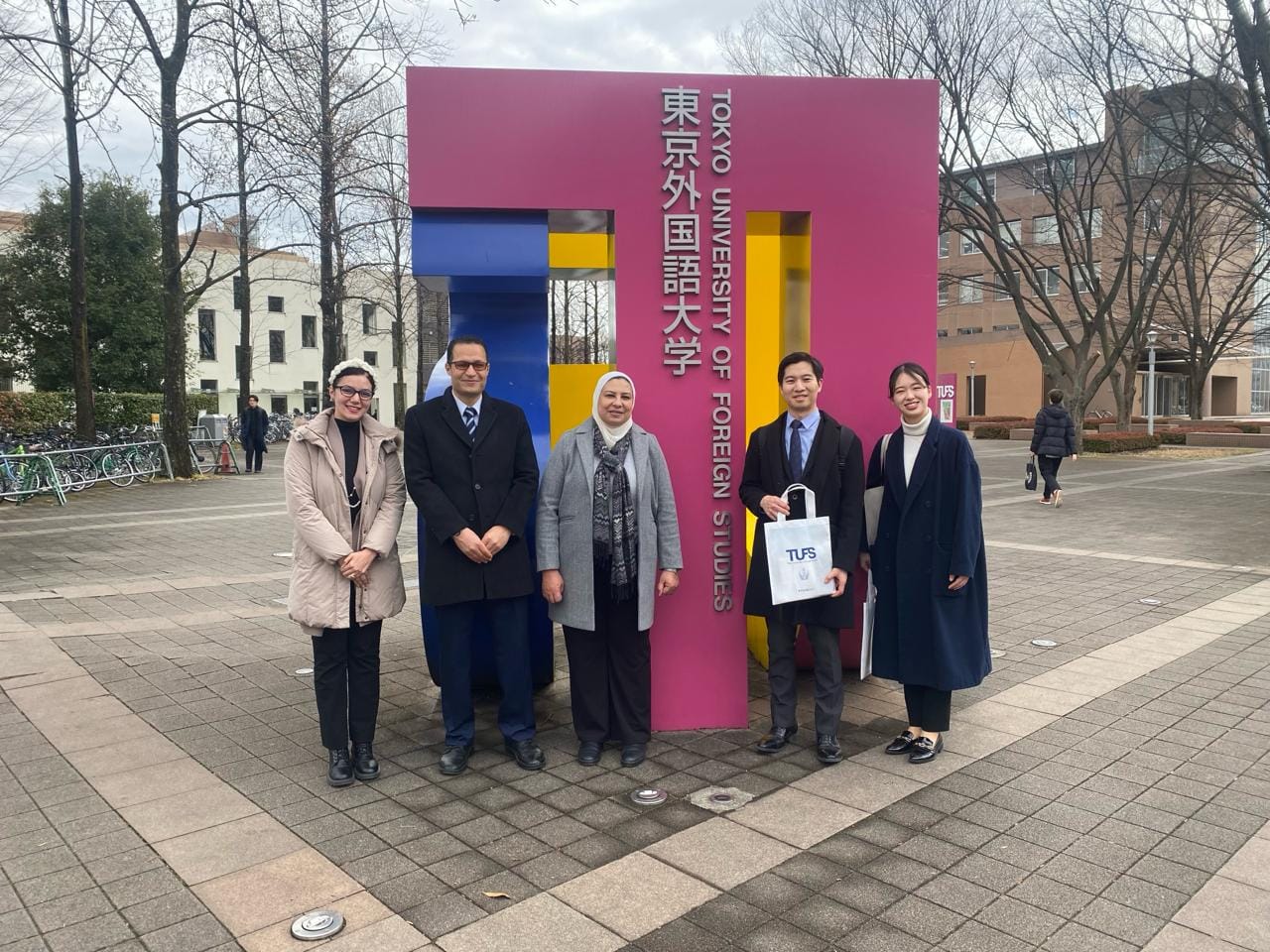 |
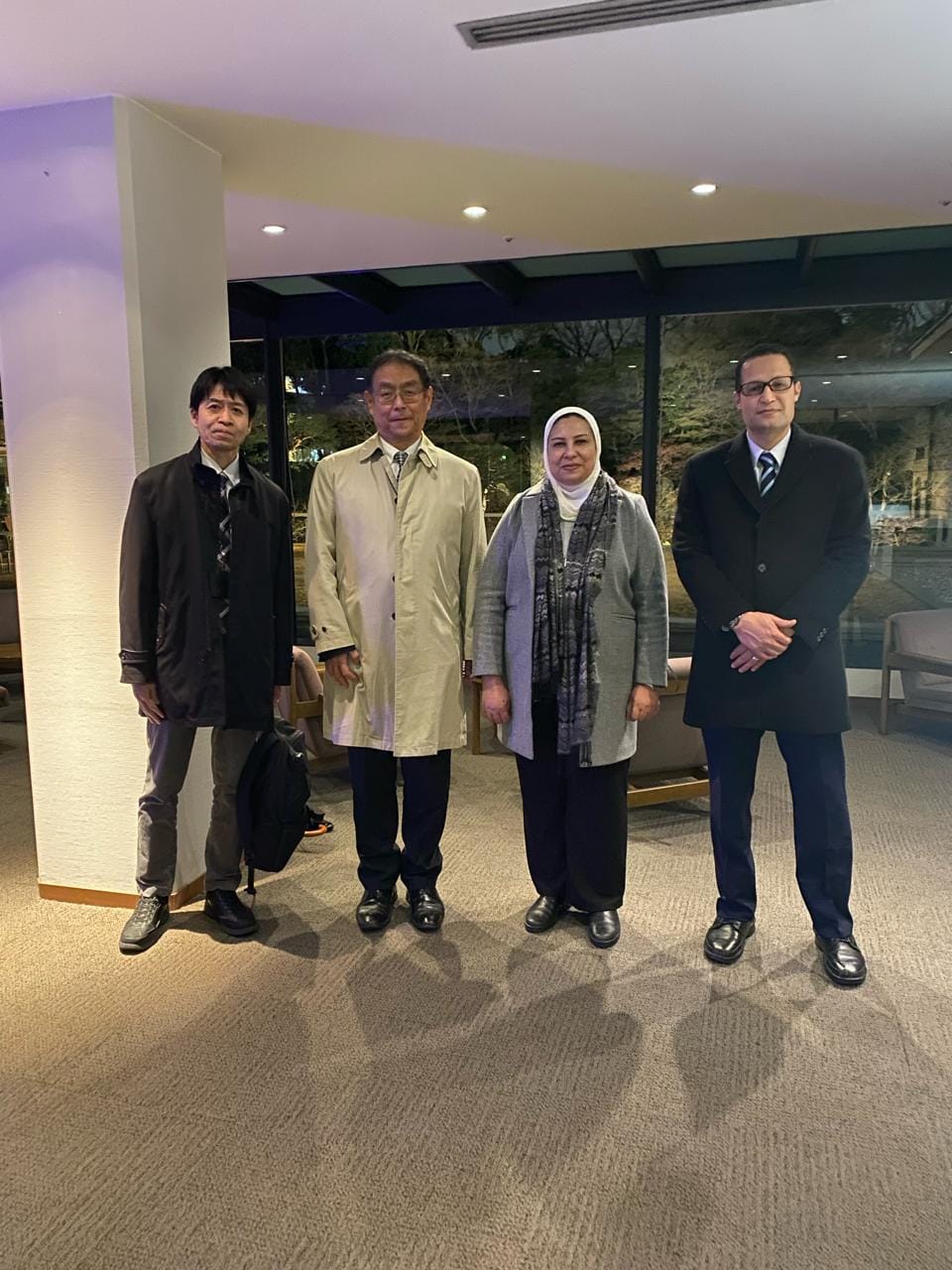 |
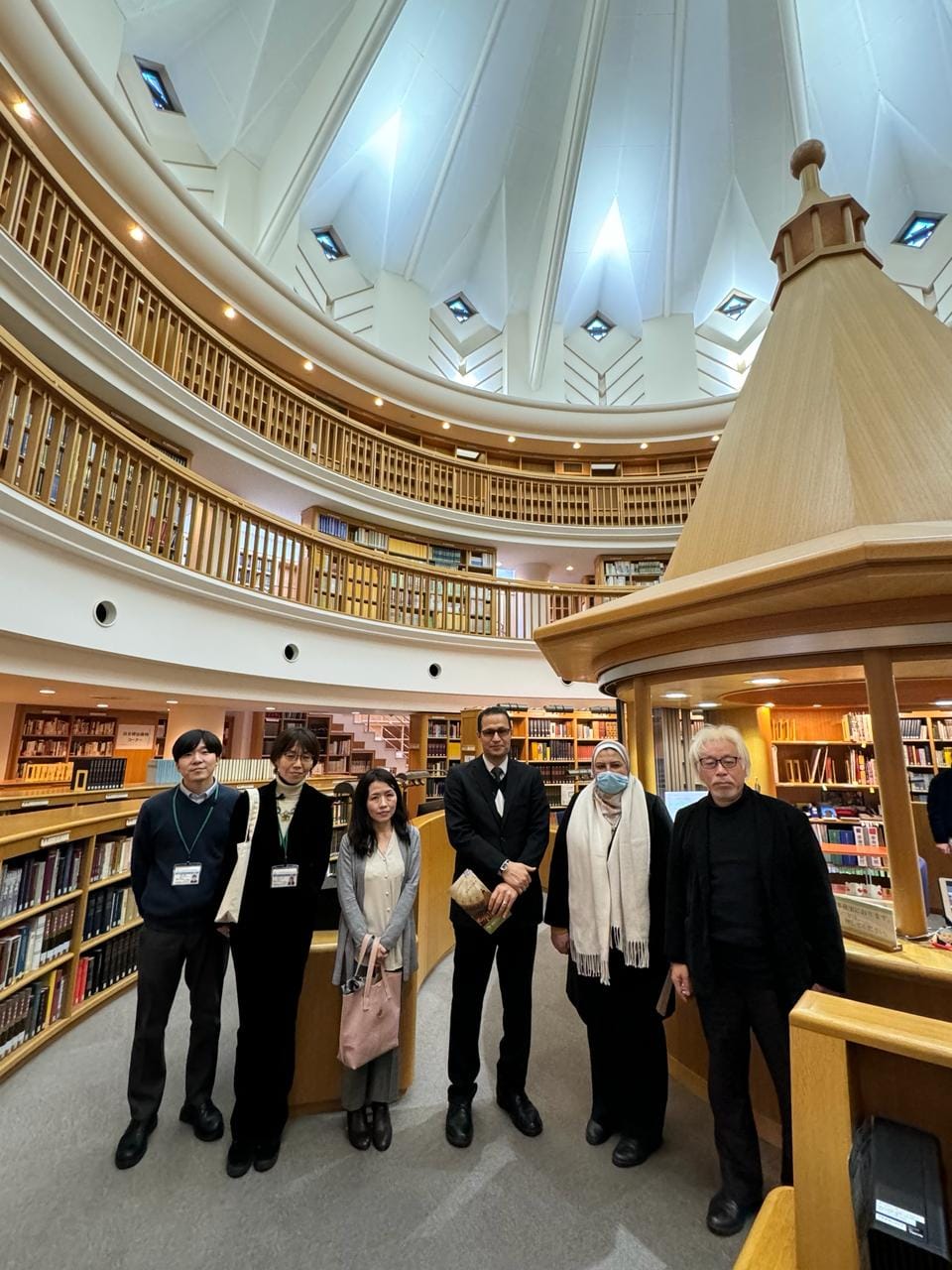 |
||
The delegation headed to the Faculty of Foreign Languages at the prestigious Osaka University, which is ranked second among Japan’s universities, whose number is close to 800 universities and graduate faculties, and among the top 100 global universities. This faculty has a well-established Arabic language department, and there is a great opportunity to build cooperation and exchange relations with this faculty in particular to agree on exchange programs for students and researchers in the Arabic and Japanese languages in the future, in preparation for expanding the circle of cooperation and exchange to include other faculties and specializations in the two universities on a larger scale. The meeting took place with the Dean of the Faculty of Graduate Studies at the Faculty of Foreign Languages, and professors of the Arabic Language Department, and the two parties exchanged a common interest in activating communication and the need to begin implementing online exchange programs, for example, between the Arabic and Japanese Language Departments at the two universities as a nucleus for scientific and academic cooperation and exchange, leading to concluding a cooperation and exchange agreement. between the two universities in the future.
The delegation returned to Tokyo to make a final visit to Chiba University in Chiba Prefecture, neighboring Tokyo. They met with a number of vice presidents of the university and professors of Arabic and Islamic studies to discuss the horizon of cooperation and the expected steps in preparation for concluding an exchange agreement between Ain Shams University and Chiba University as soon as possible. It is worth noting that Chiba University is ranked highly locally and internationally. It has a newly developed library and a unique design based on providing an attractive educational environment for students and researchers. The principles of the Arabic language are also taught at this university to more than 100 students annually. There are a number of senior professors and researchers specialized in Arabic and Islamic studies. During the meeting, the university’s vice presidents and professors expressed their great interest in cooperating with Ain Shams University and stressed their intention to continue communication to reach a form of cooperation between the two universities on a broader scale and not only at the level of language students.
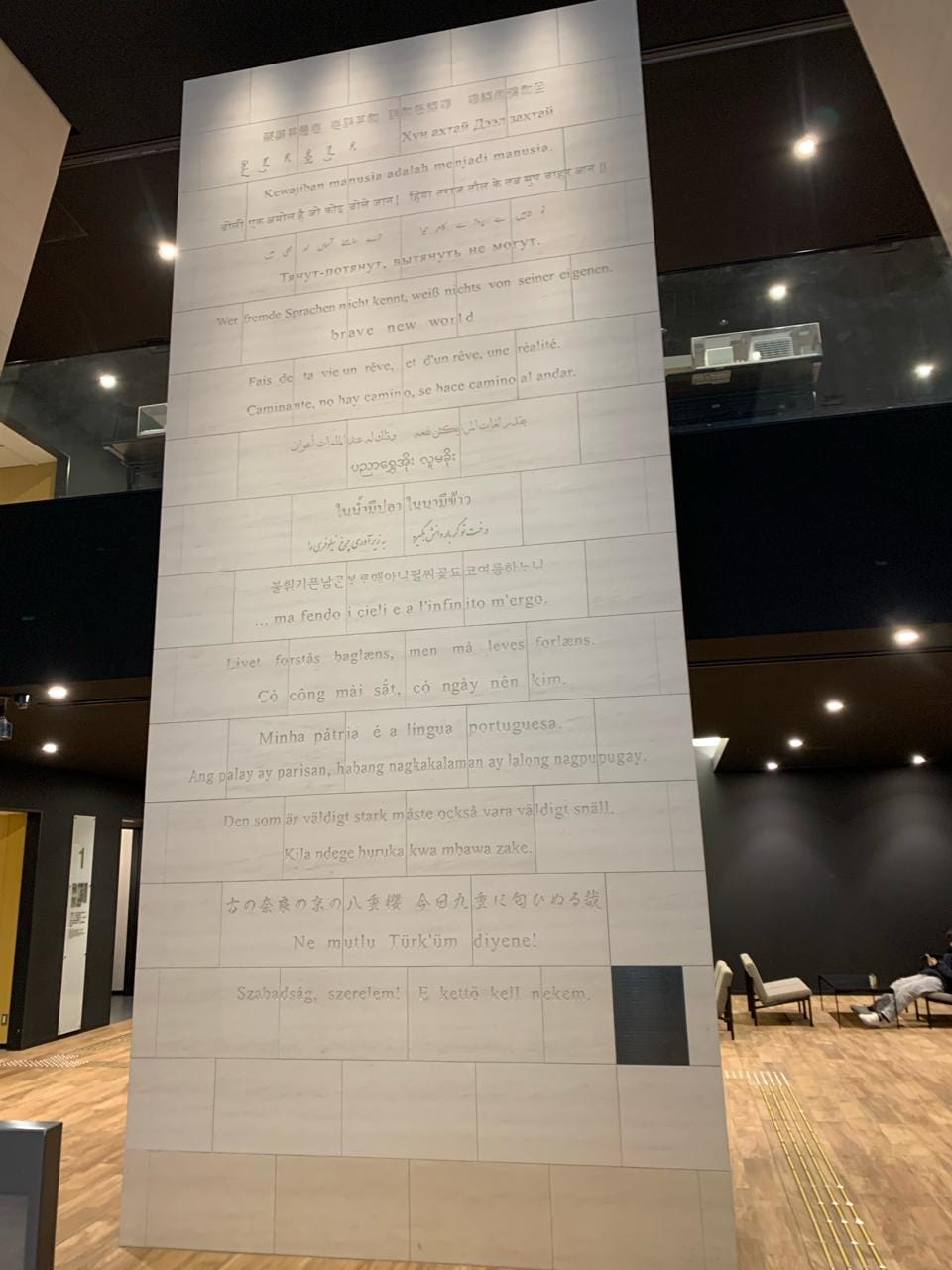 |
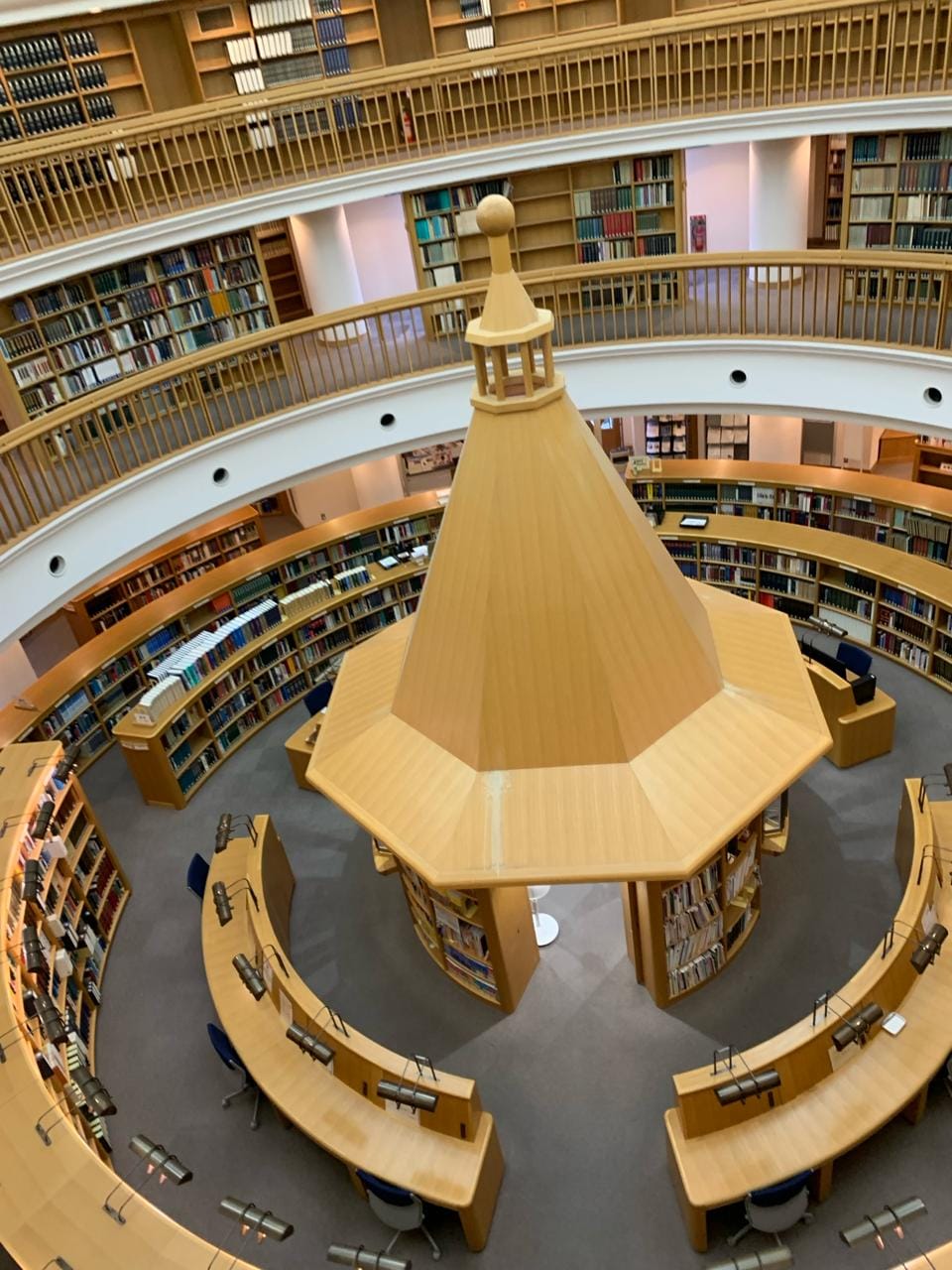 |
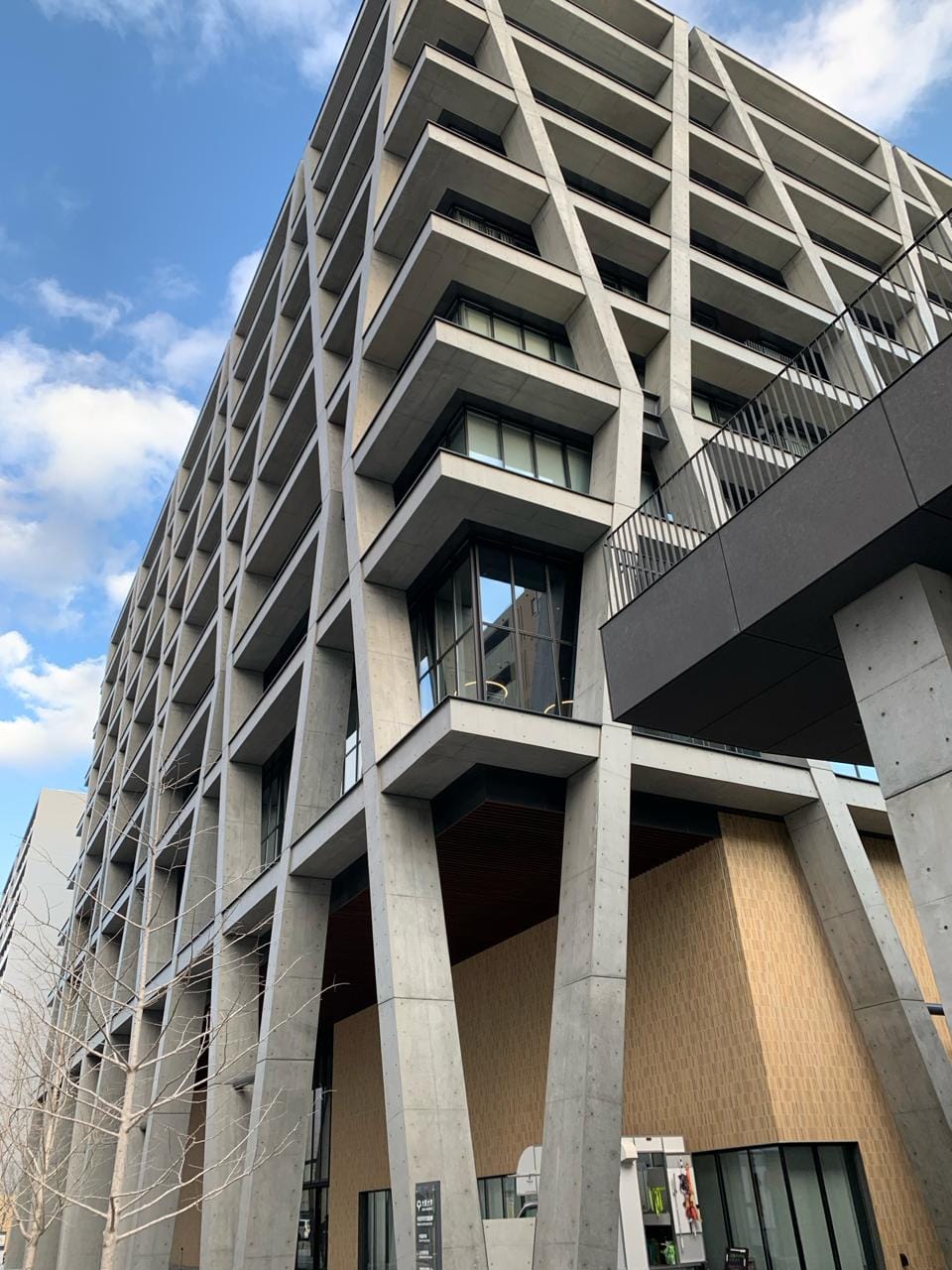 |
||
Prof. Salwa Rashad, Dean of the Faculty of Al-Alsun at Ain Shams University, explained that the visit aimed to strengthen relations and emphasize the importance of cooperation and continuous communication with the universities with which we already have exchange and cooperation agreements, as well as opening new horizons with the universities that have exchange agreements with Ain Shams University to expand the circle of exchange to include cooperation and exchange University Ain Shams as a whole, not just the Faculty of Al-Alsun, this point is important for universities that do not have Arabic language departments, as it is possible to include other colleges in the university in exchange programs and not limit the matter to the field of languages only, and to activate communication channels with universities with which we have an agreement and there is no actual exchange on the ground, and there are matters that need to intensify communication. And addressing some technical issues related to activating exchange programs, as well as expanding the circle of academic relations by visiting new universities and centers, such as the universities of Osaka and Chiba, the Nichibunken International Center for Studies of Japanese Culture, as well as the Kansai International Center for Teaching the Japanese Language of the Japan Foundation.


.svg)




